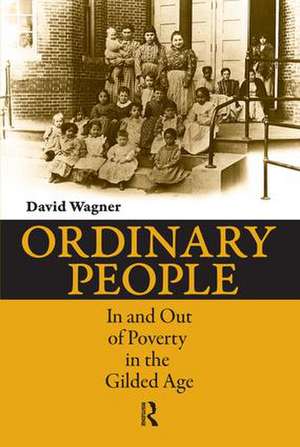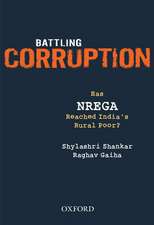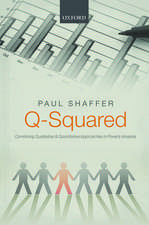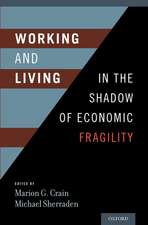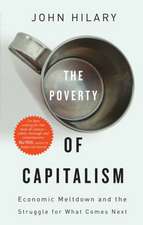Ordinary People: In and Out of Poverty in the Gilded Age
Autor David Wagneren Limba Engleză Paperback – 30 iul 2008
| Toate formatele și edițiile | Preț | Express |
|---|---|---|
| Paperback (1) | 323.44 lei 6-8 săpt. | |
| Taylor & Francis – 30 iul 2008 | 323.44 lei 6-8 săpt. | |
| Hardback (1) | 1182.15 lei 6-8 săpt. | |
| Taylor & Francis – 30 noi 2007 | 1182.15 lei 6-8 săpt. |
Preț: 323.44 lei
Preț vechi: 370.76 lei
-13% Nou
Puncte Express: 485
Preț estimativ în valută:
61.89€ • 64.79$ • 51.21£
61.89€ • 64.79$ • 51.21£
Carte tipărită la comandă
Livrare economică 05-19 aprilie
Preluare comenzi: 021 569.72.76
Specificații
ISBN-13: 9781594514616
ISBN-10: 1594514615
Pagini: 264
Dimensiuni: 152 x 229 x 14 mm
Greutate: 0.36 kg
Ediția:1
Editura: Taylor & Francis
Colecția Routledge
Locul publicării:Oxford, United Kingdom
ISBN-10: 1594514615
Pagini: 264
Dimensiuni: 152 x 229 x 14 mm
Greutate: 0.36 kg
Ediția:1
Editura: Taylor & Francis
Colecția Routledge
Locul publicării:Oxford, United Kingdom
Recenzii
“The poor are absent from our history books. David Wagner presents them to us in vivid Dickensian portraits as human beings to whom attention must be paid. He is writing about the poor in the late nineteenth century, but inevitably we are reminded of the invisible poor in our midst today. An important contribution to the social history of our country.”
—Howard Zinn
“David Wagner has written a wonderful book. By focusing close on particular lives, he gives us a uniquely intimate and specific insight into the lives of these poor and marginal people of the late nineteenth century. And he also shows us that they were more than just victims, but people who asserted themselves and often managed to build their own lives.
—Frances Fox Piven, author of Challenging Authority: How Ordinary People Change America
“This well-written and researched book follows in the tradition of C. Wright Mills … Ordinary People is based on meticulous archival research conducted at the Massachusetts State Almshouse at Tewksbury.”
—Journal of Poverty
“ … Ordinary People is an important contribution to the history of social welfare, particularly in its focus on the day-to-day stories of people who passed through the doors of Tewksbury. One could easily see this book supplementing a social welfare history class or being used in a research course as a skilled example of historiography and mixed-methods research.”
—Social Service Review
“Ordinary People is a remarkable examination of poverty from 1865 to 1895 during the Gilded Age … Wagner skillfully places his research within the context of changes in American social welfare. [He] gives us tantalizing insights into the lives of ‘ordinary’ people who needed community support in a time of rapid social change. His innovative research enriches understanding of how we have considered poverty and have chosen to deal with it.”
—Journal of Sociology and Social Welfare
—Howard Zinn
“David Wagner has written a wonderful book. By focusing close on particular lives, he gives us a uniquely intimate and specific insight into the lives of these poor and marginal people of the late nineteenth century. And he also shows us that they were more than just victims, but people who asserted themselves and often managed to build their own lives.
—Frances Fox Piven, author of Challenging Authority: How Ordinary People Change America
“This well-written and researched book follows in the tradition of C. Wright Mills … Ordinary People is based on meticulous archival research conducted at the Massachusetts State Almshouse at Tewksbury.”
—Journal of Poverty
“ … Ordinary People is an important contribution to the history of social welfare, particularly in its focus on the day-to-day stories of people who passed through the doors of Tewksbury. One could easily see this book supplementing a social welfare history class or being used in a research course as a skilled example of historiography and mixed-methods research.”
—Social Service Review
“Ordinary People is a remarkable examination of poverty from 1865 to 1895 during the Gilded Age … Wagner skillfully places his research within the context of changes in American social welfare. [He] gives us tantalizing insights into the lives of ‘ordinary’ people who needed community support in a time of rapid social change. His innovative research enriches understanding of how we have considered poverty and have chosen to deal with it.”
—Journal of Sociology and Social Welfare
Cuprins
chapterOne Ordinary People; chapterTwo The Context: The Massachusetts State Almshouse at Tewksbury, Immigration, and Industrialization; partOne Mobility: Geographic and Economic; chapterThree The “Uprooted”: Immigrants and Migrants; chapterFour Falling Down: Yet a Surprising Resilience; partTwo The “Crisis” in the Family; chapterFive “Criminal Intimacies”: Out-of-Wedlock Births; chapterSix Family Conflict and Desertion; partThree Age and Poverty: Children and the Elderly; chapterSeven Being “Put Out”: Children in and out of the Almshouse; chapterEight “We Can Do Nothing for Him”: The Fate of the Elderly; chapterNine From History’s Shadows: Part Ial Views of the Poor;
Descriere
Explores the lives of poor people during the three decades after the Civil War using their biographies and official records.
